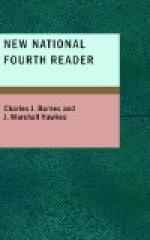So it swept with a bustle right through
a great town,
Creaking the signs and scattering down
Shutters, and whisking with merciless
squalls,
Old women’s bonnets and gingerbread
stalls.
There never was heard a much lustier shout,
As the apples and oranges tumbled about.
Then away to the fields it went blustering
and humming,
And the cattle all wondered whatever was
coming.
It pulled by their tails the grave, matronly
cows,
And tossed the colts’ manes all
about their brows,
Till, offended at such a familiar salute,
They all turned their backs and stood
silently mute.
So on it went, capering and playing its
pranks;
Whistling with reeds on the broad river
banks;
Puffing the birds, as they sat on the
spray,
Or the traveler grave on the king’s
highway.
It was not too nice to hustle the bags
Of the beggar, and flutter his dirty rags.
’Twas so bold that it feared not
to play its joke
With the doctor’s wig, and the gentleman’s
cloak.
Through the forest it roared, and cried
gayly, “Now
You sturdy old oaks, I’ll make you
bow!”
And it made them bow without more ado,
Or it cracked their great branches through
and through.
Then it rushed like a monster o’er
cottage and farm,
Striking their inmates with sudden alarm;
And they ran out like bees in a midsummer
swarm.
There were dames with their kerchiefs
tied over their caps,
To see if their poultry were free from
mishaps;
The turkeys they gobbled, the geese screamed
aloud,
And the hens crept to roost in a terrified
crowd;
There was raising of ladders, and logs
laying on,
Where the thatch from the roof threatened
soon to be gone.
But the wind had passed on, and had met
in a lane
With a school-boy, who panted and struggled
in vain;
For it tossed him, and whirled him, then
passed, and he stood
With his hat in a pool, and his shoe in
the mud.
Then away went the wind in its holiday
glee,
And now it was far on the billowy sea;
And the lordly ships felt its powerful
blow,
And the little boats darted to and fro.
But, lo! it was night, and it sunk to
rest
On the sea-birds’ rock in the gleaming
west,
Laughing to think, in its frolicsome fun,
How little of mischief it really had done.
* * * * *
Directions for Reading.—Let some pupil in the class state the manner in which the lesson should be read.
Point out four lines that should be read more quietly than the rest of the lesson.
Vary the reading by having parts of lesson read as a concert exercise.
What effect has the repetition of the word now, in the second and third lines?
* * * * *
Language Lesson.—Let pupils write six sentences, each containing one of the following words, used in such a manner as to show its proper meaning: right, write; reed, read; tied, tide.




